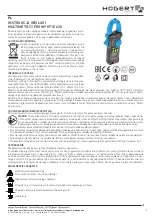
9
Adres producenta/ Adresse des Herstellers/ Manufacturer’s Address/ Адрес производителя
GTV Poland Sp. z o.o. Sp. k., ul. Przejazdowa 21, 05-800 Pruszków
NCV MEASUREMENT:
Set the rotary switch to the NCV position and close the NCV detector on the measured wire, the instrument can detect if the measured
wire has a voltage > 90V AC. When the instrument detects AC voltage, the alarm buzzer will start and the backlight will flash.
Note: 1) Even if there is no alarm, the cable may be live. Detection may be affected by factors such as different socket designs and
types of insulation thickness, etc.
DC VOLTAGE MEASUREMENT
1. Insert the red plug into the „INPUT” socket and the black plug into the „COM” socket.
2. Set the function range switch to voltage and press the „SEL” button to switch to DC measurement mode. Connect the probe to the
object to be measured, and the polarity of the red tip terminal will be displayed at the same time.
3. Read the measurement from the display.
MESSAGES!
∆ If the range of the voltage to be measured is not known in advance, set the function range switch to the maximum range position and
then gradually decrease until a satisfactory resolution is obtained.
∆ When measuring high voltage, special care must be taken to avoid electric shock.
AC VOLTAGE MEASUREMENT
1. Insert the red plug into the „INPUT” socket and the black plug into the „COM” socket.
2. Set the function range switch to voltage and press the „SEL” button to enter AC measurement mode. Connect the probe to the object
to be measured, and the polarity of the red tip terminal will be displayed at the same time.
3. Read the measurement from the display.
MESSAGES!
∆ When measuring high voltage, special care must be taken to avoid electric shock.
LowZ: low impedance measurement
1. Insert the red plug into the „INPUT” socket and the black plug into the „COM” socket.
2. Set the function range switch to low resistance and connect the probe to the measured load, while the polarity of the terminal con-
nected by the red probe will be displayed simultaneously.
3. Read the measurement from the display.
MESSAGES!
∆ When measuring high voltage, special care must be taken to avoid electric shock.
ALTERNATING CURRENT MEASUREMENT
1. Set the function range switch in the AC measurement range.
2. Push the trigger and open the terminal head while hooking the wire in the terminal to measure the current. However, it is not possi-
ble to make a measurement when two or three wires are simultaneously within reach of the head.
3. Read the measurement from the display.
Note: If the range of the measured current is not known in advance, set the function range switch to the maximum current range
position and then gradually decrease until a satisfactory resolution is obtained.
RESISTANCE MEASUREMENT
1. Insert the red and black plug into the „INPUT” and „COM” terminals respectively.
2. Set the function range switch to the required range Ω and connect the probe to the measured resistance.
3. Read the measurement from the display
Note:
∆ If the measured resistance exceeds max. value of the selected range, „OL” will appear on the display, in this case select a higher
range
∆ When checking the online resistance, turn off all power supplies in the measured circuit and completely discharge all capacitors.
∆ When measuring resistances above 1 MΩ a stable reading can only be obtained after a few seconds. This is normal for high resistance
measurements.
DIODE TEST
Insert the red plug into the „INPUT” socket and the black plug into the „COM” socket. In this case, the polarity of the red plug is „+”. Set
the function range switch to
, connect the red sensor to the positive measured diode and connect the black sensor to the negative
one. The reading on the display is a positive voltage drop of the measured diode.
CIRCUIT ON/OFF TEST
Insert the red plug into the socket „Ω” and the black plug into the „COM” socket and set the function range switch to , at the same
time connect the probe to both points of the measured circuit. During the conduction test, the buzzer will sound when the measured
resistance is less than 60 Ω and the buzzer may or may not sound when it is between 60 Ω and 120 Ω and the buzzer will not sound
when it is more than 120 Ω.
TECHNICAL INDICES
General features: max. voltage CATIII between the voltage input terminal and ground is 600 V and 600 V ~
Display mode: LCD display, max. the reading is 5999
AC measurement mode: True RMS
Transducer measurement










































